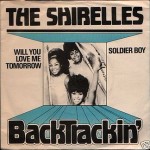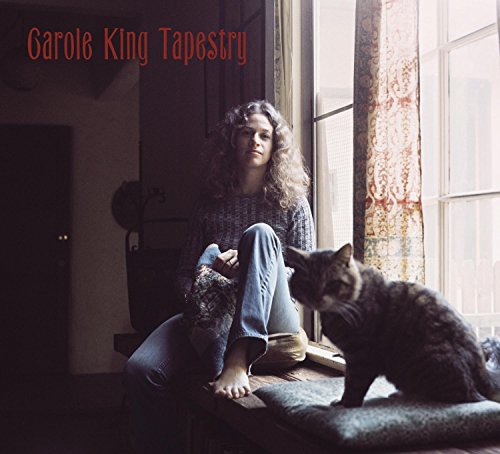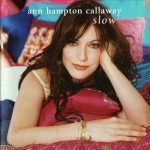“Will You Love Me Tomorrow” (sometimes called “Will You Still Love Me Tomorrow”) was the first hit written by Brill Building writing team (and then husband and wife) Carole King and Gerry Goffin. The original version by the Shirelles became the first song by an all-female group to go to number one in the rock era and the durable, timeless standard has literally been recorded dozens of times since then.
 What is it about this song that makes it so enduring? Perhaps it’s the way its simple, relatable lyrical concept is married to its emotionally elegiacal melody. Like most great songs, it’s hard to imagine the lyrics and melody existing apart from each other—as if they were created as one. Because “Will You Love Me Tomorrow” translates so well from genre to genre, language to language, and decade to decade, it has become one of the great copyrights—a published song with multiple recordings—of its era (or any era, for that matter); it sounds equally good with a full orchestra or small group, on the guitar or piano, uptempo or as a ballad. Depending on the interpreter, it’s convincingly country, rock, R&B, or Broadway. 50 years on it is safe to say that there is very little this song cannot do! The fact that it continues to be recorded every year ensures that it will continue to be as vital in years to come as it was back in 1960. What has happened to WYLMT over the years is truly the dream of every songwriter. Here is the original Shirelles version followed by a (very) partial list of significant cover versions.
What is it about this song that makes it so enduring? Perhaps it’s the way its simple, relatable lyrical concept is married to its emotionally elegiacal melody. Like most great songs, it’s hard to imagine the lyrics and melody existing apart from each other—as if they were created as one. Because “Will You Love Me Tomorrow” translates so well from genre to genre, language to language, and decade to decade, it has become one of the great copyrights—a published song with multiple recordings—of its era (or any era, for that matter); it sounds equally good with a full orchestra or small group, on the guitar or piano, uptempo or as a ballad. Depending on the interpreter, it’s convincingly country, rock, R&B, or Broadway. 50 years on it is safe to say that there is very little this song cannot do! The fact that it continues to be recorded every year ensures that it will continue to be as vital in years to come as it was back in 1960. What has happened to WYLMT over the years is truly the dream of every songwriter. Here is the original Shirelles version followed by a (very) partial list of significant cover versions.

This partial list of the song’s cover versions is truly astonishing—an accomplishment that will rarely be equaled in todays vastly changed music publishing business.
- Brenda Lee released her own version in 1961 on the album Emotions.
- Ronnie James Dio with his band The Prophets released their version of the song as a single in 1962.
- Ben E. King released a cover on his 1962 album Ben E. King Sings for Soulful Lovers
- The Chiffons released their version in 1963 on their album: He’s So Fine.
- Dusty Springfield included her version as a track on her 1964 album A Girl Called Dusty. Springfield also recorded a French-language version of the song called Demain tu peux changer. She also re-recorded the song in 1980, but this recording remains unissued.
- Carla Thomas released a version on her 1965 album Comfort Me.
- Lesley Gore covered the song on her 1966 Sings All About Love album.
- Jackie DeShannon released a version on her 1966 album Are You Ready For This?
- Cher released a version on her 1966 album Cher.
- The Four Seasons had a #24 hit with this song on the Billboard Hot 100 in 1968.
- Francoise Hardy recorded her own version on her 1969 album En Anglais album known in the U.S. and Canada as Loving.
- Linda Ronstadt released an alt-country-ish version on her 1970 album Silk Purse.
- Bruce Springsteen’s “Dr. Zoom and the Sonic Boom” recorded a live version in 1971, which can be heard on YouTube.

- Carole King, the writer of the song, included a version on her 1971 album Tapestry, with Joni Mitchell and James Taylor on background vocals. Tapestry was a phenomena: it became one of the biggest selling albums of all-time and cultural zeitgeist moment that defined the emerging consciousness of women in America.
- Roberta Flack’s version hit number seventy-six on the Billboard Hot 100 in 1972 as Will You Still Love Me Tomorrow.
- Smokey Robinson included the song on his first solo album in 1973.
- Melanie Safka (better known as Brand New Key’s “Melanie”) reached 82 on the Billboard Hot 100 in 1973 and reached the Top 40 in the United Kingdom in 1974.
- Jody Miller made the country charts with a remake of the song in 1975.
- Morningside Drive released a dance version of the song in 1975, which reached #33 on the Billboard Hot 100.
- Dave Mason had a #39 hit on the Billboard Hot 100 in 1978 with his remake. It was his final top forty hit on that chart.
- Brotherhood of Man released their version as a single in 1980.
- Rainbow played a cover of this song during the 1980 dates of their Down to Earth tour, including whilst headlining the 1980 Monsters of Rock festival at Donington Park.
- Maureen Tucker of The Velvet Underground recorded it as the B-side on the single Around and Around in 1981.
- Dionne Warwick recorded the song with The Shirelles on her 1983 album, How Many Times Can We Say Goodbye. I like this version because of her historical connection to the Shirelles and their inclusion here.

- Laura Branigan remade it for her 1984 album Self Control. This version is straightforward and heartfelt. My friend Woody Firm who worked with Laura at Atlantic Records cites this as his favorite version and he makes a strong argument. I’m including it here as a final installment of my Obscure Laura Branigan feature!
- Elton John sang it at the Prince’s Trust benefit concert in 1987. It was the first song he performed publicly after having undergone vocal cord surgery at the beginning of that same year. Elton John’s version of the song has not officially been released.
- Millie Jackson recorded a cover for the 1989 album Back to the Shit.
- The Afghan Whigs released a cover of the song on their 1991 7″ Ornament. The version featured Marcy Mays of the band Scrawl on vocals with The Afghan Whigs lead singer Greg Dulli on background vocals.
- Joe Walsh recorded a version which was featured on his 1992 album Songs for a Dying Planet.
- Patti LaBelle and Loretta Devine sang a ballad version of the song on LaBelle’s short-lived sitcom Out All Night in 1992.
- Björn Again recorded a dance version on their 1993 album Flashback!
- Bryan Ferry had a hit in the United Kingdom with his version in 1993.
- Neil Diamond included this song on his 1993 album, Up on the Roof: Songs from the Brill Building.
- Laura Nyro covered the song on her final album Angel in the Dark which was recorded in 1994-95 but only released in 2001 after her death.
- Debbie Gibson recorded a cover of this song for her 1995 album Think With Your Heart. (This version is mistakenly attributed to Carly Simon on p2p networks quite a bit).
- The Bee Gees recorded what Carole King called “the definitive version” for a Carole King tribute album entitled Tapestry Revisited in 1995. (I have to share that as much as I love the Bee Gees—which as awful lot—and hate to disagree with the song’s author, I think this version has dated poorly, primarily owing to the keyboard sounds and the mix).
- Dianne Reeves recorded a smooth jazz version on her 1997 album That Day.
- Lorrie Morgan recorded a country version of the song in 1997 for her Gold album Shakin’ Things Up.
- Jennifer Peña recorded a Spanish version on her album Jennifer y los Jetz entitled Cuando Despierte Mañana in 1997.
- Shawn Colvin covered the song for the closing credits of the series finale of The Larry Sanders Show in 1998.
- Minnie Driver’s character sings the song in the film Beautiful.
- Mest uses the hook in the refrain of their song “Reason” on Destination Unknown released in 2001.
- Lauryn Hill performed the song during her 2006 tour but it was never released.
- John Frusciante of the Red Hot Chili Peppers frequently played a live version of the song featuring only guitar and vocals during the band’s 2006-07 Stadium Arcadium tour.
- Joni Mitchell references this song in her song Chinese Café/Unchained Melody from the album Wild Things Run Fast, with the line “You give your love so sweetly” (1983)
- American Idol (season 10) contestant James Durbin performed the song during Carole King week in April 2011.
- U2 played a snippet of the song in Denver at their U2 360 Tour concert on May 21, 2011, in Winnipeg at their 360 concert on May 29, 2011, in Montreal at their 360 concert on July 8, 2011, in Seattle, Washington on June 4, 2011, and in Miami, Florida at their 360 concert on June 29, 2011. The song led into U2’s live favorite Where The Streets Have No Name.
- Amy Winehouse recorded it for the 2004 film Bridget Jones: The Edge of Reason, slowing down the tempo and using a jazz arrangement. Another version is included in posthumous album Lioness: Hidden Treasures as Will You Still Love Me Tomorrow 2011. It’s interesting to compare her two versions.
Bridget Jones version:
Lioness Version:
 If I had to pick one favorite version, at this moment it would be the great Ann Hampton Calloway’s recording from her 2004 album Slow. Jazzy, simple, and emotionally connected, she conveys the essence of the song in a way that is both elegant and direct.
If I had to pick one favorite version, at this moment it would be the great Ann Hampton Calloway’s recording from her 2004 album Slow. Jazzy, simple, and emotionally connected, she conveys the essence of the song in a way that is both elegant and direct.
There is a version of this song for every day, every mood. I could have just as easily have gone with Laura Nyro or Roberta Flack or Dusty Springfield. So what’s your favorite version?
You may also enjoy:
Obscure Laura Branigan, Volume One: Gloria
13 Songs that Should Have Been Top-10 Pop Hits, Volume 1: or, Has the Beat Killed Melody on American Radio?
13 Songs that Should Have Been Top-10 Pop Hits, Volume 2




woody
March 28, 2013 at 12:24 amNice job
David Munk
March 28, 2013 at 2:18 pmWOODY! I really appreciate your support and interest in Stargayzing, which is quite important as I endure what seems like deluge of hate mail from fans who are symbiotically attached to the memory of Michael Jackson and affronted by my piece about him.
james tano
April 14, 2013 at 2:42 ambravo to you for mention AHCallaways amazing version of this song. desert island disc indeed – jim
David Munk
April 14, 2013 at 5:27 pmHi James. Well thank you so much for commenting! You know this song is so powerful, versatile and, in a way, teflon, that there are actually many excellent versions. I spent more time with the Roberta Flack version while I was writing the piece and I found it worthy of being singled out as well.
I hope you’ll stay in touch! If you are on twitter you can follow me at @stargayzingone, or maybe sign up for the Stargayzing newsletter on the home page!
David